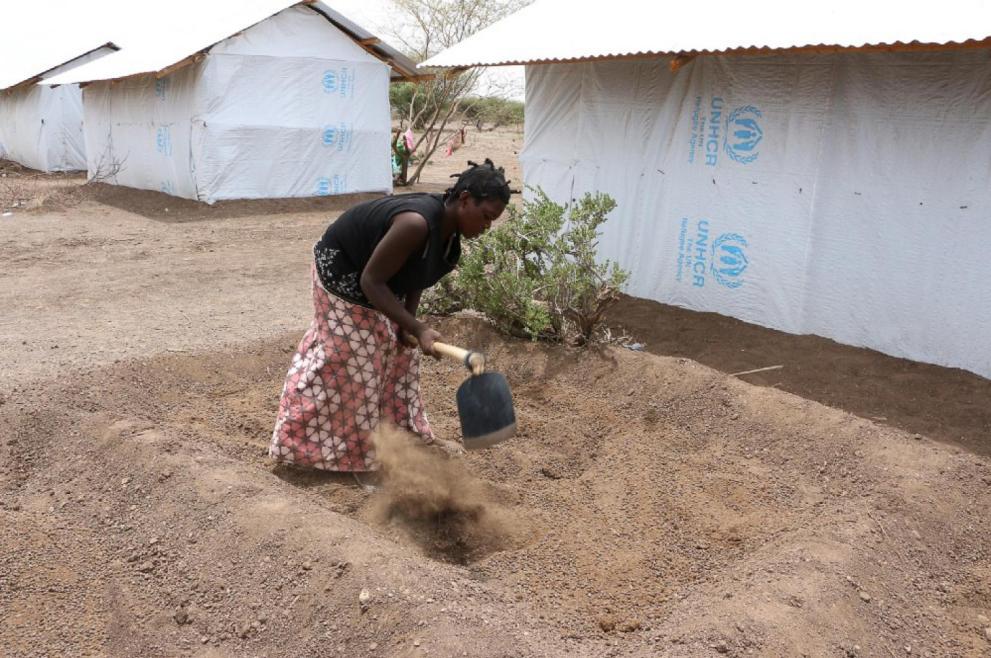
Ishara Baraka scoops mounds of manure and diligently mixes it with the soil. She is preparing a garden behind her house in Kalobeyei settlement in readiness for planting. “Back home, I was a farmer. Here, I intend to plant cowpeas and vegetables such as amaranth and okra,” said Ishara, a 23-year-old refugee from the Democratic Republic of Congo. “Vegetables are good for the body.” WFP and FAO, with funding from the EU Trust Fund for Africa, have introduced dryland farming methods as a first step to in improve food production and nutrition and increase self-reliance among refugees.
Since its opening in 2016, 38,000 refugees have settled in Kalobeyei, which is supported by WFP cash transfers, called Bamba Chakula, Swahili slang for ‘get your food’. Refugees use the cash to buy food at the local market where host and refugee communities trade side by side. “Without vegetables in the diet, children may fall ill easily,” said Rhoda Jokudu Martin. “I want to plant my own food to supplement the cash we get through Bamba Chakula.” Twenty-three-year-old Rhoda and her 27-year-old husband David Yespota James came from Central Equatoria in South Sudan at the end of 2016. “The government agriculture officers trained us on layout and construction of sunken beds. We were given a hoe, a rake and some manure. The sunken beds will help keep water for longer, allowing the crop to grow to maturity,” said David.
Twenty-four-year-old Dorcas Kaunda Raphael fled instability in eastern Democratic Republic of Congo. A mother of four whose life back in Congo entailed farming a large tract of land is now only able to till a five-by-six metre plot behind her temporary house. “This place is dry. It doesn’t rain. In Congo, rain was never a problem,” said Dorcas. “But I know the importance of growing my own food. With my small plot, I don’t go for a day without green vegetables.” While other backyard plots have withered in the dry heat, Dorcas’ plot is lush with spinach, amaranth and sweet potato vines. “Water is a challenge, but I have to water my garden at least once a day,” said Dorcas. “I cannot afford to buy vegetables on a daily basis with the cash from [WFP],” said Dorcas. Dorcas received farm tools, seeds and manure through the integration project funded by the European Union Emergency Trust Fund for Africa. WFP and FAO are working with Turkana County Government training the farmers on digging furrows and sunken beds and basins to conserve rainwater.
Kalobeyei settlement, near the Kakuma refugee camps, opened in June 2016 as a model to increase self-reliance and integrate refugees with the local people. The settlement brings the Kenyan host and refugee populations together to jointly participate in economic, educational and livelihood activities. Together, the county government, the World Food Programme (WFP), the Food and Agriculture Organization (FAO) and partners, with funding from the European Union Emergency Trust Fund for Africa, are supporting crop growing in backyard gardens using sunken beds and other technologies.
Details
- Publication date
- 12 June 2018
- Region and Country
- Kenya
- Thematic
- Greater economic and employment opportunities
- Partner
- Food and Agriculture Organization
- United Nations High Commissioner for Refugees
- UNICEF
- World Food Programme
